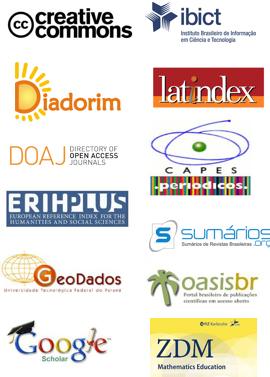Apropriações de Dewey na Educação Matemática: Estudo de um Livro de Aritmética para o Ensino Primário
DOI:
https://doi.org/10.17921/2176-5634.2018v11n2p186-193Resumo
O presente artigo tem como foco o primeiro volume da série The Alexander-Dewey arithmetic, voltado ao ensino primário. Tal série teve Georgia Alexander como autora, John Dewey como editor e foi publicada nos anos 1920 nos EUA. O objetivo foi explorar a tradução do pensamento de Dewey no ensino de aritmética no primário no interior do primeiro volume da referida série. Buscou-se estabelecer diálogo com outras obras de Dewey, principalmente os livros How we think (1910) e The school and society (1899), para tanto mobilizando a noção de apropriação e problematizando questões relacionadas à produção escrita e ao processo editorial, com base em autores como Roger Chartier e Peter Burke. Dentre as constatações, percebe-se que o livro de aritmética analisado estrutura a apresentação dos conteúdos e o desenvolvimento das atividades privilegiando a introdução social. Ainda incentiva o aluno enquanto sujeito de sua aprendizagem. Outros elementos fortemente presentes são o recurso à indução e a situações concretas. Tais características podem ser associadas ao pensamento de Dewey, tendo como elemento reforçador o fato que ele foi editor da série.
Palavras-chave: John Dewey. Educação Progressiva. The Alexander-Dewey Arithmetic. Introdução Social.
Abstract
The focus of the following article is the first volume of the series The Alexander-Dewey arithmetic, designed to primary school. The series was published in the 1920s in the USA, Georgia Alexander was the author and John Dewey was the editor. The aim of the article is to explore the translation of Dewey’s thought in the arithmetic teaching in primary school according to the first volume of the aforesaid series. In order to establish a dialogue with other Dewey’s works, the main references were the books How we think (1910) and The school and society (1899). The analysis was developed based in the notion of appropriation and inquiring about aspects of writing production and publishing process, relying in such authors as Roger Chartier and Peter Burke. It is possible to say that the analysed arithmetic textbook organizes the insertion of the subjects and the development of activities focusing the social introduction. It also stimulates the pupils to be active in the learning process. Some other elements that stand out are induction based introductions and concrete examples. Such characteristics can be traced to Dewey’s thought, which can be reinforced by the fact he was the editor of the series.
Keywords: John Dewey. Progressive Education. The Alexander-Dewey Arithmetic. Social Introduction.
Referências
Alexander, G. (1920). A new spelling book: grades three & four.
New York: Longmans, Green and Company. Disponível em
https://archive.org/details/anewspellingboo01alexgoog
Alexander, G. (1921a). The Alexander-Dewey arithmetic:
elementary book. New York: Logmans, Green and Company.
Alexander, G. (1921b). The Alexander-Dewey arithmetic:
intermediate book. New York: Logmans, Green and Company.
Alexander, G. (1922). The Alexander-Dewey arithmetic:
advanced book. New York: Logmans, Green and Company.
Bittencourt, C. M. F. (2004). Em foco: história, produção e
memória do livro didático. Educ Pesq, 30(3), 1-3.
Burke, P. (2003). Hibridismo cultural. São Leopoldo, RS:
Unisinos.
Chartier, R. (2014). A mão do autor e a mente do editor. São
Paulo: UNESP.
Chartier, R. (2002). Os desafios da escrita. São Paulo: UNESP.
Cremin, L. A. (1964). The transformation of the school:
progressivism in American education, 1876-1957. New York:
Vintage Books.
Dewey, J. (1910). How we think. New York:D. C. Heath & Co.
Dewey, J. (1913). The school and society. Chicago: The
University of Chicago Press.
Rabelo, R. S. (2017). A série The Alexander-Dewey arithmetic:
apropriações da educação progressiva. Zetetiké, 25(3), 388-
Rabelo, R. S. (2016). Destinos e trajetos: Edward Lee Thorndike
e John Dewey na formação matemática do professor primário
no Brasil (1920-1960). São Paulo: USP.
Rabelo, R. S. (2014). John Dewey in mathematics textbooks: end
of the 19th century and the early 20th century. Proceedings of
the ICMT, 389-394. Southampton: International Conference
on Mathematics Textbook Research and Development.
Southampton.
Santos, I. B. (2006). Edward Lee Thorndike e a conformação de
um novo padrão pedagógico para o ensino de matemática
(Estados Unidos, primeiras décadas do século XX). (Tese de
Doutorado em Educação, Pontifícia Universidade Católica de
São Paulo).
The Elementary School Journal. (1915). Educational Writings,
(1), 12-21.
The Elementary School Journal. (1925). The Alexander-Dewey
arithmetic, 25(7).
The Journal of Education. (1921a). Socialized dramatized
arithmetic, 93(23), 647.
The Journal of Education. (1921b). A new kind of arithmetic,
(12), 332-335.


